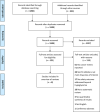The association of sodium-glucose cotransporter 2 inhibitors with cancer: An overview of quantitative systematic reviews
- PMID: 32704566
- PMCID: PMC7375059
- DOI: 10.1002/edm2.145
The association of sodium-glucose cotransporter 2 inhibitors with cancer: An overview of quantitative systematic reviews
Abstract
Aims: To summarize reported cancer events associated with SGLT-2 inhibitors used in patients with type 2 diabetes mellitus, as well as assess the quality of included reviews.
Materials and methods: In May 2019, we searched PubMed, Embase and the Cochrane Library for quantitative systematic reviews assessing the safety of SGLT-2 inhibitors. Data were abstracted using a standardized form, and methodological quality was assessed using the AMSTAR 2 tool. Main outcome measures included total cancer events and specific cancers such as breast cancer, bladder cancer, gastrointestinal cancer, prostate cancer, respiratory cancer, renal cancer and skin cancer. Pooled treatment effects from included reviews were summarized for SGLT-2 inhibitors as a class and for individual SGLT-2 inhibitors commonly used worldwide (canagliflozin, dapagliflozin and empagliflozin).
Results: We screened 1248 unique citations, of which eight quantitative systematic reviews meta-analysed results from studies reporting the association between an SGLT-2 inhibitor and any cancer. Only one review was rated as high quality according to AMSTAR 2 assessment. In total, data from 170 cancer-related point estimates (PE) were reported. As a class, SGLT-2 inhibitors were not associated with an increased risk of any cancer event versus placebo and active comparators. Most point estimates (7/143) were nonsignificant for individual cancers except for two associations. Empagliflozin was associated with an increased risk of bladder cancer versus placebo and active comparators in two reviews, while canagliflozin appeared protective for gastrointestinal cancer versus placebo and active comparators in one review.
Conclusions: It appears that SGLT-2 inhibitors are not associated with an increased risk of total cancer or specific cancers in patients with type 2 diabetes. However, higher quality evidence is needed to derive confident conclusions.
Keywords: SGLT2 inhibitors; adverse events; cancer; overview of reviews; type 2 diabetes; umbrella reviews.
© 2020 The Authors. Endocrinology, Diabetes & Metabolism published by John Wiley & Sons Ltd.
Conflict of interest statement
None of us have any financial arrangements or any potential conflicts of interest to disclose with regard to the products in this manuscript.
Figures
References
-
- Lipscombe L, Booth G, Butalia S, et al. Pharmacologic glycemic management of type 2 diabetes in adults. Can J Diabetes. 2018;42:S88‐S103. - PubMed
-
- Zinman B, Wanner C, Lachin JM, et al. Empagliflozin, cardiovascular outcomes, and mortality in type 2 diabetes. N Engl J Med. 2015;373(22):2117‐2128. - PubMed
-
- Perkovic V, Jardine MJ, Neal B, et al. Canagliflozin and renal outcomes in type 2 diabetes and nephropathy. N Engl J Med. 2019;380(24):2295‐2306. - PubMed
Publication types
LinkOut - more resources
Full Text Sources
Research Materials



